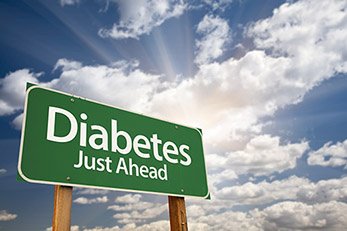A few years ago a patient said to me, “Dominique, you act like everyone has diabetes.” That really struck home. I had been explaining to him that he should exercise regularly (about 300 min/week) and eat a mostly plant-based diet with enough lean, heart healthy protein and occasional high-fiber grains. “That’s how my aunt has to eat,” he said. ”She has diabetes but I don’t,” he expressed. Suddenly, I realized what I had probably been recommending all along—eat as if you have diabetes and you are less likely to get it. What is diabetes? Diabetes is a disease in which the body is unable to properly use and store carbohydrate or blood sugar. Diabetes happens when either the pancreas (an organ that helps with digestion and controlling blood sugar) does not produce any insulin or produces very little insulin, or when the body does not respond well to insulin, which is called “insulin resistance.”
While some risk factors for developing diabetes are based on your family history, many have to do with your lifestyle behaviors. Your weight, activity level, some medical conditions, and high blood pressure can put you at risk for developing diabetes. The good news is that these risk factors can be changed. So you can stop diabetes in its tracks by making sure you are living a healthy lifestyle.
Here are 3 ways to avoid diabetes:
- Maintain a healthy weight.While scientists are not exactly sure why, we do know that carrying extra weight increases your likelihood of developing diabetes. Following a mostly plant-based diet with heart healthy proteins and a small amount of high-fiber carbohydrates is an excellent way to achieve and maintain a healthy weight.
- Stay active.The more active you are and the more muscle you have, the better your body is able to handle the sugars you do eat (even the healthy ones like fruit and dairy). Exercise of all types makes the body more sensitive to insulin, which means that it can do a better job of controlling your blood sugar.
- Avoid prediabetes.While this sounds obvious, keeping a close eye on the blood tests that indicate prediabetes (fasting blood sugar, insulin, HbA1C, and others) can help you reverse a progression towards diabetes before it becomes too late. Talk to your doctor about having these tests done at your next appointment.
Yes, there are also things outside your control like family history, race and age that can increase the risk for diabetes. But if you lower the risks you can change, you can minimize those you can’t.
Back to the comment from the patient of mine who does not yet have diabetes. I was emphasizing the importance of maintaining a healthy weight with a healthy plant-dominant diet and watching carbohydrate intake (starches like bread and pasta but also dairy products, juices and sweets). I was stressing the importance of regular exercise, both cardiovascular and strength training. I was recommending what I have to so many patients over so many years. After I thought about his comment, I replied “Yes, I suppose I am asking you to eat and exercise as if you have diabetes—because that is one of the best ways of making sure you don’t get it.” He remains healthy and diabetes-free today.
